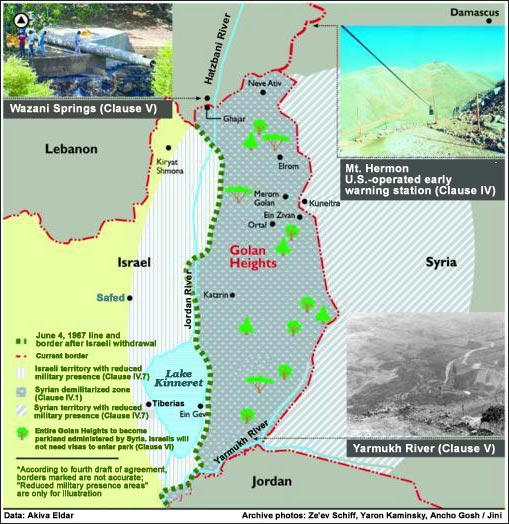Secret Israel-Syria Peace Pact?
Haaretz Correspondent Akiva Eldar reports that the governments of Israel and Egypt held a “series of secret meetings in Europe between September 2004 and July 2006” that created a series of “understandings.”
- An agreement of principles will be signed between the two countries, and following the fulfillment of all commitments, a peace agreement will be signed.
- As part of the agreement on principles, Israel will withdraw from the Golan Heights to the lines of 4 June, 1967. The timetable for the withdrawal remained open: Syria demanded the pullout be carried out over a five-year period, while Israel asked for the withdrawal to be spread out over 15 years.
- At the buffer zone, along Lake Kinneret, a park will be set up for joint use by Israelis and Syrians. The park will cover a significant portion of the Golan Heights. Israelis will be free to access the park and their presence will not be dependent on Syrian approval.
- Israel will retain control over the use of the waters of the Jordan River and Lake Kinneret.
- The border area will be demilitarized along a 1:4 ratio (in terms of territory) in Israel’s favor.
- According to the terms, Syria will also agree to end its support for Hezbollah and Hamas and will distance itself from Iran.
The map below illustrates the territorial shifts:

Obviously, an agreement along these lines between Israel and Syria would be a huge step toward peace in the region, comparable to the 1978 Camp David Accords between Israel and Egypt. I remain incredibly skeptical at the moment, however.
First, the negotiation period was followed by an Israel-Hezbollah-Syria mini war. That hardly inspires confidence that an “understanding” has been reached.
Second, it’s far from clear why Syria would give up so much given what appears to be a position of relative strength.
Third, presuming such an accord were signed in good faith, there’s no reason to believe the Assad government could control Hezbollah. Not only would Iran be able to cover the gap easily enough but there is plenty of money available to finance the continued killing of Israeli civilians and ensure that the Palestinian cause doesn’t go away as a means of diverting Arab attention from the malfeasance of their governments.





